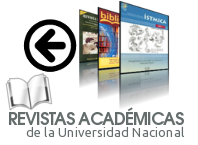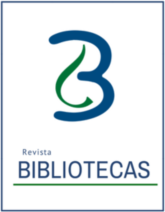Reorientando la educación en bibliotecología y ciencia de la información para la sociedad de la información
Algunas reflexiones
Palabras clave:
Educación, Biblioetcología, Información, Sociedad, Comunicación, Tecnologías, BibliotecologíaResumen
A lo largo de la historia, el desarrollo de la agricultura tardó siglos en concretarse, en expandirse y en darse a conocer en la mayoría de las culturas. Durante los últimos 200 años, parte de la humanidad ha sido dominada por la actividad industrial. Mientras el resto del mundo se esfuerza por participar en la Revolución
Industrial, algunas naciones atraviesan por una etapa que transforma todo de un modo extraordinariamente acelerado. Es lo que se conoce como “sociedad de la información”. No cabe ninguna duda, de que la sociedad está entrando en una nueva era, en que cada aspecto de la vida de las personas se caracteriza por las aplicaciones de las Tecnologías de la Información y de la Comunicación (TIC). Se presentan, en este nuevo medio ambiente, algunos cambios que deben plantearse en la formación de los profesionales de la información.
Referencias
Allen, K. B. ( 1990, May). The information society: Will the right to know become the need to know?. CD-ROM Professional, 3(3), 6-7.
Ashton, S., & Levy, P. (1998). Networked learner support in higher education: Initiatives in professional development and research for a new role.Journal of the American Society for Information Science, 49(9), 850-853.
Asynchronous Transfer Mode (ATM) Fundamentals. (2003). Recuperado Marzo 17, 2003, de International Engineering Consortium Web site: http:// www.iec.org/online/tutorials/atm_fund/
Bender, D. R. (1998, July). A strategy for international information policy. Libri, 43(3), 210-231.
Best-Nichols, B. (1997). Technologies change organizational and occupational structures: Librarian, cybrarian, or?. En P. Ensor (Ed.), The CybrarianManual (pp. 385-394). Chicago: American Library Association.
Carbo, T., & Almagno, S. (2001). Information ethics: The duty, privilege and challenge of educating information professionals. Library Trends, 49(3), 510-518.
Castells, M. (1996). The rise of the networked society. Oxford: Blackwell.
Cornella, A. (1994). Los recursos de información: Ventaja competitiva de las empresas. Madrid: McGraw-Hill.
Cronin, B. (2002). Holding the center while prospective at the periphery: Domain identity and coherence in North American information studies education. Education for Information, 20, 3-10.18
Crowley, B. (1999). The control and direction of professional education. Journal of the American Society for Information Science, 50(12), 1127-1135.
Drucker, P. (1993). Post-capitalist society. New York: Harper Business.
Duff, A. S. (2002). The status of information society studies in the information science curriculum. Library Review, 51(3/4), 139-148.
Eliasson, G., Folster, S., Lindberg, T., Pousette, T. & Taymaz, E. (1990). The knowledge-based information economy. Stockholm: Industrial Institutefor Economic and Social Research.European Commission. (1998). Content and commerce drive strategies in global networks: Executive summary: Directorate-General XIII/E.Luxembourg.
García Marco, F. J., & Agustín Lacruz, M. D. C. (2000). Educating the information professional of the 21st century: A ten-point proposal based on the Spanish context. Education for Information, 18(2/3), 141-154.
Garrod, P. (1997, July). Skills for new information professionals (SKIP): Findings of an ELIB project. Infocus, 2(1), 6-10.
Garrod, P. (1998, July). Skills for new information professionals (SKIP): Anevaluation of the key findings. Program, 32 (3), 241-263.
Gibbs, S., & Linley, R. (2000). "A bit of a mess?": Training and education for information workers in the voluntary sector. Education for Information,18(2/3), 155-168.
Goulding, A., Bromham, B., Hannabuss, S., & Cramer, D. (2000). Professional characters: The personality of the fut ure information workforce. Education for Information, 18(1), 7-32.
Holt, G. E. (1996). On becoming essential: An agenda for quality in twenty-first century public libraries. Library Trends, 44 (3), 545-571.
Hornby, S. (2001). Teaching the information society: Pragmation or pangloss?. Education for Information, 19, 253-257.
Houghton, J. M., & Todd, R. J. (2000). Overcoming image: Strategies for librarians in the new millennium. En P. Ensor (Ed.), The Cybrarian ́s Manual 2 (pp. 282-290). Chicago: American Library Association. Infoethics: First International Congress on Ethical, Legal and Societal Aspects of Digital Information. (1997) UNISIST Newsletter, 25(1), 1-2.
Jorna, K. (2002). Educating information professionals in a multicultural information society. Library Review, 51(3/4), 157-163.19
Kaminsky, M. (1999). The importance of information studies. School Libraries in Canada, 19 (2), 18-22.
Koren, J. (1991). Towards an appropriate image for the information professional: An international comparison. Libri, 41(3), 170-182.
Kuhlthau, C. C. (1990). Information skills for an information society: A review of research. Information Reports & Bibliographies, 19 (3), 14-26.
Mahon, B. (1997). Surviving as an information professional. Tidskrift for Dokumentation, 52 (1/2), 51-55.
McGarry, K. (2000). Professional education: Some reflections. Education for Information, 18(2/3), 105-113.Moore, N. (1998, September). The future demand for information professionals in Europe. Education for Information, 16 (3), 191-209.
Muddiman, D. (1996). Information and library education: A manifesto for the millennium. Librarian Career Development, 4(4), 20-24.
Muddiman, D. (1999). Towards a postmodern context for information and library education. Education for Information, 17 (1), 1-19.
Nicolson, M. (1998). The remaking of librarians in the knowledge era: Skills to meet future requirements. Education for Library and Information Science:Australia, 15, 33-35.
Preston, H. (2001). Report on the 4th British-Nordic Conference on Library and Information Studies: Continuity, Culture, Competition -the future of Library and Information Studies Education? New Library World, 102(1166/1167), 283-285.
Radford, G. P. (2003, January). Trapped in our own discursive formations: Toward an archaeology of library and information science. The Library Quarterly,73(1), 1-18.
Roberts, N., & Konn, T. (1991). Librarians and professional status: Continuing professional development and academic libraries. London: LibraryAssociation.
Schmidt-Braul, I.-E. M. (1999). Does culture create new jobs in the information society?: Strategic issues and new professional profiles. LibrarianCareer Development, 7 (12), 127-138.
Solomon, G. (1995, April 30). The information revolution spurs demand for librarians. National Business Employment Weekly, 33.
Stoker, D. (2000). Persistence and change: Issues for LIS educators in the first decade 20 of the twenty first century. Education for Information, 18(2/3), 115-122.
Strife, M. L. (1995). Special libraries and instruction: One -on-one public relations. Reference Librarian, 51/52, 415-419.
Stueart, R. D. (1998, September). Preparing information professionals for the next century. Education for Information, 16 (3), 243-251.The 2002 Information Society Index. (2002). Recuperado Abril 21, 2003, de http://www.worldpaper.com/2002/feb02/isi.jpg
Unesco. (1997, January 21). Unesco and an information society for all. Recuperado Abril 21, 2003, de http://www.unesco.org/cii/telematics/gis.htm
Wagner, G. S. (2000). Future of education for library and information science: Views from Australia. Education for Information, 18 (2/3), 123-129.
Descargas
Publicado
Cómo citar
Número
Sección
Licencia
Bibliotecas proporciona acceso abierto inmediato a sus contenidos, basándose en el principio de facilitar la investigación al público de manera gratuita y libre para favorecer el intercambio global del conocimiento.
La revista Bibliotecas es una publicación acogida por una institución de educación superior pública, la cual, es sustentada por recursos públicos. Desde sus inicios, la revista ha ofrecido todos sus contenidos de forma gratuita sin ninguna restricción a los derechos de: lectura, descarga e impresión a texto completo. Los trabajos publicados en Bibliotecas pueden ser analizados, citados y reproducidos total o parcialmente, mencionando la fuente original.
La revista Bibliotecas está bajo la licencia de Creative Commons Reconocimiento – No Comercial – Compartir Igual, 4.0 Internacional; por lo que se permite: compartir, copiar y redistribuir el material en cualquier medio o formato.

Este obra está bajo una licencia Creative Commons Atribución-NoComercial-CompartirIgual 4.0 Internacional.









